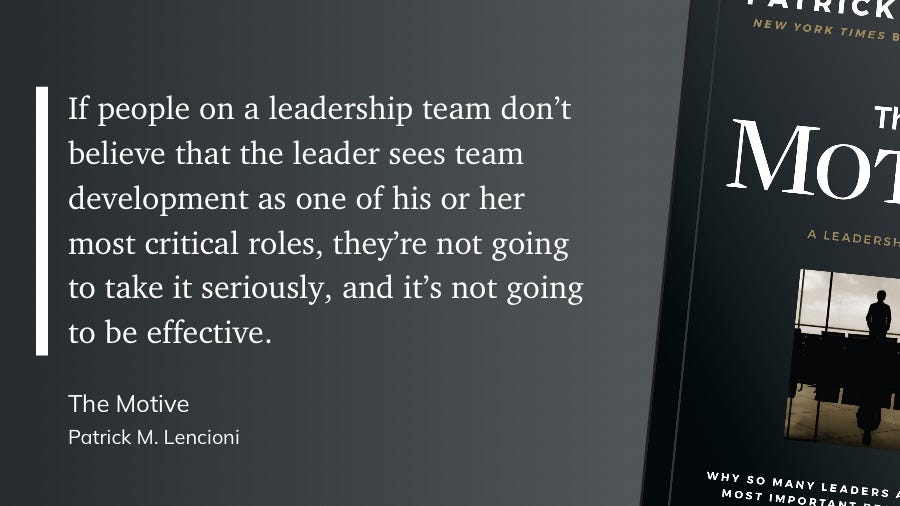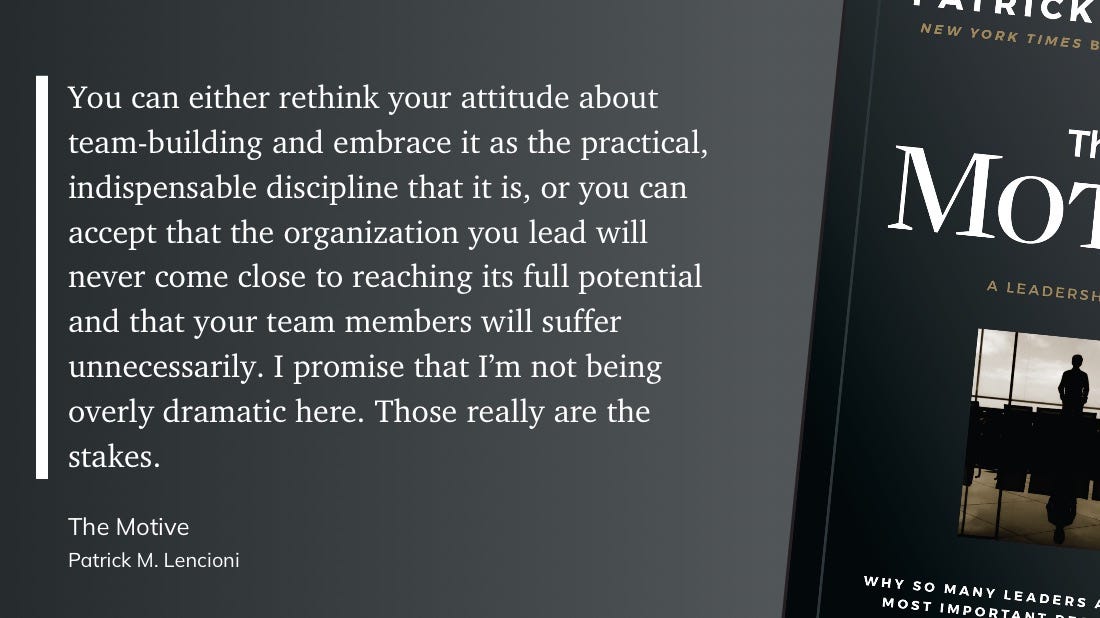25 Reasons Why Most Leadership is Bad
I came up with this list of 25 reasons why most leadership is bad while preparing to write a different article. I wanted to write an essay about how internal change agents can help transform — or survive — their less-than-stellar organizations. I had to describe the kinds of organizations change agents find themselves. It always comes down to leadership.
I’ve spent most of my career as an internal change agent (or intrapreneur). I’ve been fortunate to rise to the executive level, where I had or felt the freedom to act without getting permission. But there was always resistance.
What Is Leadership?
Here are my favorite definitions:
Joel Barker: “A leader is someone you choose to follow to a place you would not go by yourself.”
Doug Conant: “Leadership is the art and science of influencing others.”
Here are 25 reasons most leadership is bad!:
#1: I have the Wrong Motivation
I want to be a leader because:
I receive financial rewards
I have power
I exercise control
I’m self-focused and evaluate everything based on “what’s in it for me” or “how will this hurt me?”

#2: I have no Leadership Philosophy
No aspirational philosophy or strategy
I’m managing behaviors and getting through
Lack of trust
Feel and spread fear — everyone cowers
I talk philosophy, but I don’t walk the talk
Philosophy changes based on my circumstances
#3: I Don’t Know How to Lead
Simplistic philosophy
I’m just Riding the Beast until I can have a Safe Exit (or RBSE)
#4: I Don’t Walk My Talk
Say one thing, do another
I model the opposite of what I say I want others to do
#5: I Think I Can Talk My Way Through Anything
Implicitly thinks everyone else is stupid
They’re not stupid!!!
However, I’m often able to talk my way through RBSE
#6: Mutual Dependency with my Boss
We both profess not to know about the problems or say/believe “everything is fine” because that helps each of us RBSE
“If you don’t point out my inadequacies, I won’t point out yours
Sometimes my boss is a Board or a Commission that is not in a position to know the problems, and because I carefully manage them to protect my job and RBSE
#7: Leadership is Hard
I have to listen AND act
That takes time and effort, and I’m already too busy
Leadership puts RBSE at risk
#8: I Don’t Have Time for That
According to Tom Peters:
You = Your calendar*
*The calendar NEVER lies.
#9: I’m Habitually and Intentionally Uninformed
I mistrust any results or information that don’t fit my desired narrative (and protect my RBSE)
“Who said that? That’s not what my people would say!”
#10: My Leadership Team is Dysfunctional
Lack of trust, avoid conflict, lack of commitment, no accountability, inattention to results
More emphasis on calling it a “Leadership Team” (status over results)
No or inconsistent team-building
Psychologically unsafe for us (and the people who report to us)
I’m unwilling to build the team
I avoid going first and being vulnerable to build trust
#11: I’m a Bad Supervisor
I don’t coach or mentor my subordinates
Poor people management framework
I’m more focused on technical performance than the well-being of people who get the work done
I don’t put in the time required
Consequently, I’m a poor role model for my managers, who are also bad supervisors
#12: Bad Manager of Managers
Flawed role model for other managers
I “don’t want to micromanage” (i.e., manage) unless it threatens my RBSE, in which case I’ll reach down into the organization, bypassing my direct reports and undermining trust, conflict over ideas, commitment, accountability, and results
I favor faux harmony over results
#13: I’m Not Accountable
I blame others
“It’s Not my fault”
Invulnerable
Don’t hold myself accountable
I hold others accountable when I perceive threats to my RBSE
Poor role model
I always use accountability when talking about someone else, not myself
#14: I Don’t Take Action
Sometimes I don’t know that action is needed
I also don’t act when I do know (unless my RBSE is under siege)
Poor role model
When I don’t take action, people give up
“Bill’s office is where good ideas go to die!”
The listening tour helps you know the problems and what you should do. Once you know, you must take action!
#15: I Always Have An Answer
I have to solve every problem
I have an answer in my head before I even hear your take on the problem and possible solutions
I listen to respond
My questions aren’t (really) questions, but designed to get what I want (again, I’m not listening)
In other words, I use questions to manipulate others, so I get what I want (and especially RBSE)
#16: I have Blind Spots and Favorites
Everyone can see my bias and bad decisions (except others whose RBSE might be at risk)
Really!
#17: Control Freak
I want to make all the decisions
I have to make all the decisions
I have to approve everything
I gum up the works with bureaucracy
“We’re traveling at the speed of ME!”
Our strategic principle: “Think small, go slow”
#18: I Avoid Responsibility
They say people leave managers, not organizations
I say, “So and so left because they got a great offer from XYZ Corp.”
I also attribute my beliefs and opinions to others (“I’ve heard others say that you [blah. blah. blah.] <-- This thing YOU believe)
I practice gaslighting
#19: I’m Greedy
I’m motivated by more $$$ for [me, shareholders, etc.]
I assume others are motivated by money
#20: Corruption
It happens, and bad leadership may overlook or otherwise tolerate it (until and unless my RBSE is threatened, which is also often too late)
#21: I’m waiting for the Boss to Lead
“My boss isn’t doing [ABC Good Thing], so why should I?”
#22: Submit to External Politics
“I’m powerless here”
“I have to!”
#23: Lack of Communications
I assume communications is top-down (we have to do more telling)
I don’t share my thinking
I don’t reinforce messages (repeat seven times in seven ways, so the message sinks in)
I don’t L.I.S.T.E.N.! (see above)
I’m a poor role model because I don’t walk my talk (see #4 above)
#24: “Our Culture is Strong”
I ignore signs our culture is problematic for several reasons cited above (lack of time, don’t want to do talk that I have to walk, gotta protect my RBSE, etc.)
I prefer to tinker with the culture rather than take steps to transform it and make it better for everyone)
Psychological Safety: Is it safe for people to speak up without fear of negative consequences?
Who’s responsible for that?

#25: Protect What I Have
I’ve arrived and want to continue reaping my financial and other rewards
I have to protect my RBSE!
RBSE represents my fear
This list is my first draft, and I’m sure I’ve left things out and gotten some wrong. In this type of organization, people, especially front-line supervisors, are burned out and frustrated with the top leadership team and senior management.
I presented reasons why I think most leadership is bad. Poor leadership is fixable when leaders are willing to do what’s necessary, beginning with themselves and their motivations for being a leader.
I can hear it now:
“Don’t be naïve, Bill. This is the game!”
I agree this is the game for mediocre organizations. Intrapreneurs and change agents prefer — feel compelled — to pursue excellence!
What have I gotten wrong? What have I left out?
Leave a comment below 👇🏾👇🏾👇🏾 and let me know what you think.




Hey Bill. Great list. How about “Surround myself with people who think like I do.” Don’t believe in diversity of thought and opinion. Make sure your direct reports are not as smart as you.